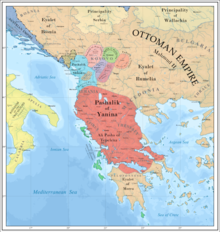Begolli family
Appearance

The Begolli family is an Albanian noble family, which rose to prominence in present-day Kosovo in the Ottoman era and were an influential feudal family in the region.[1][2][3]
History
[edit]The Begolli were influential in Rrafshi i Dukagjinit area, Plav-Gusinje, and down to Shkodër.[4] They were landowners and held private armies.
Their first known member may have been Mere Hüseyin Pasha, Grand Vizier of the Ottoman Empire in the 16th century.
Notable members
[edit]- Qerim Begolli, delegate at Assembly of Vlora[5] and Albanian Congress of Trieste.[6]
- Qazim Begolli, activist of kachak movement, member of Committee for the National Defence of Kosovo.[7]
- Refat Begolli, politician, Albanian Minister of Economy of Ibrahim Biçakçiu's cabinet (7 September – 25 October 1944).[8]
- Faruk Begolli (1944–2007), Albanian actor and director.
- Mahmut Pasha of Begolli, Ottoman-Albanian governor and military commander
See also
[edit]References
[edit]- ^ Gail Warrander; Verena Knaus (2010). Kosovo (2 ed.). Guilford, CT : The Globe Pequot Press. p. 11. ISBN 9781841623313.
- ^ Gjergj Fishta (2005), Robert Elsie; Janice Mathie-Heck; Centre for Albanian Studies (eds.), The Highland Lute, London, England: I.B. Tauris, p. 404, ISBN 9781845111182
- ^ Besi Bekteshi (2011-12-25), Pse mohohet fisnikëria shqiptare nën osmallinjtë?! [Why the Albanian nobility under the Ottomans gets denied?!] (in Albanian), Radio Islame,
...familja e Beg-oglluve (Begolli),...
- ^ Anna Di Lellio; Robert Elsie (2009). The battle of Kosovo 1389: an Albanian epic. I.B. Tauris. p. 185. ISBN 9781848850941. OCLC 312626753.
- ^ Michael Schmidt-Neke (16 November 1987), Entstehung und Ausbau der Königsdiktatur in Albanien (1912-1939): Regierungsbildungen, Herrschaftsweise und Machteliten in einem jungen Balkanstaat, Oldenbourg Wissenschaftsverlag, p. 320, ISBN 978-3486543216
- ^ "Kongresi Shqipetar Trieste". Shipkovica. Retrieved 5 March 2011.
- ^ Sheradin Berisha (2004-10-21), Kryengritja shqiptare e vitit 1915 [The Albanian uprising of 1915] (in Albanian), Pasqyra, retrieved 9 February 2014,
Më 6 gusht 1914 konsulli austriak Karl, nga Durrësi njoftonte Ministrinë e Punëve të Jashtme në Vjenë "mbi fillimin e aksioneve kundër pushtuesve serb"nga Hasan Prishtina, Selim Batusha, Bajram Daklani, Qazim Begolli e Halim Deralla (djali i Mehmet Derallës-Sh. B), të cilët kishin me vete"lëndë plasëse dhe municion për mauzerët".
- ^ Bushi, Ilir (12 May 2012), Kryeministrat shqiptarë gjatë 100 vjetëve të prirur për atentate, pabesi dhe goditje pas shpine [Albanian prime-ministers through 100 years, fond of assassination attempts, infidelity, and backstabbing] (in Albanian), Revista Drini, archived from the original on 2 February 2014, retrieved 1 February 2014,
7 shtator 1944 – 25 tetor 1944: Ibrahim Biçaku – Kryeministër dhe Ministër i Brendshëm, Ethem Cara – Ministër i Financave, Rrok Kolaj – Ministër i Arsimit, Lefter Kosova – Ministër i Punëve Botore, Rifat Begolli – Ministër i Ekonomisë, Akile Tasi – Ministër i Kulturës
